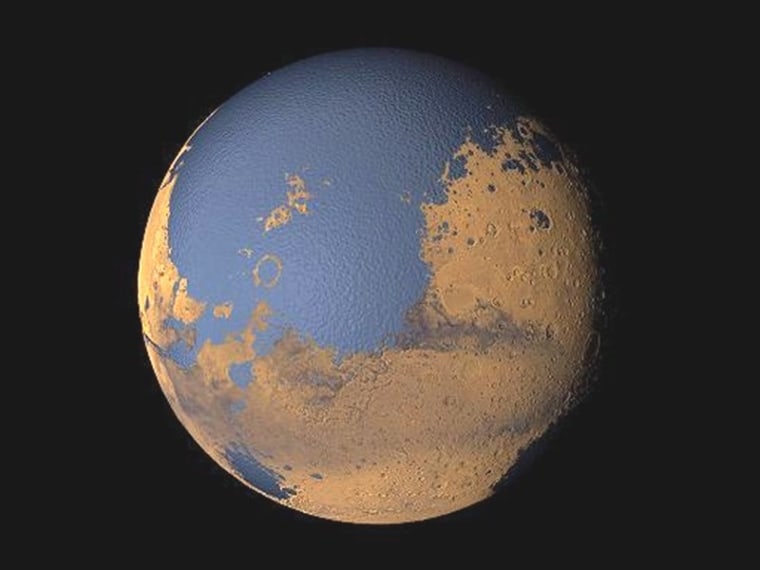Are we all Martians? A controversial hypothesis contends that life on our planet had to get its start somewhere else — most likely on Mars — because the chemistry on early Earth couldn't have provided the required molecular machinery.
"The evidence seems to be building that we are actually all Martians; that life started on Mars and came to Earth on a rock," Steven Benner, a chemist at the Florida-based Foundation for Applied Molecular Evolution, said in a news release. What's more, recent studies suggest that the conditions suitable for the origin of life "may still exist on Mars," he said.
Scientists have long debated the idea that life got its start elsewhere in the universe, and then was transported to Earth on meteorites or comets — an idea known as panspermia. In a presentation to the annual Goldschmidt Conference in Florence, Italy, Benner lays out an unusually detailed case for panspermia involving early Mars and Earth.
Livable Mars, deadly Earth?
For years, scientists have been saying that although present-day Mars is an inhospitable place, it was much more habitable billions of years ago. The findings from NASA's Curiosity rover on Mars have added fresh support to such claims.
The early environment on Earth, however, was challenging to the rise of life as we know it, at least in Benner's view. One of the biggest challenges has to do with the process by which organic molecules gave rise to life's chemical building blocks: RNA, DNA and proteins.
If left to themselves, adding energy to organic molecules just tends to turn them into tar or an oily substance. That's what Benner calls the "tar paradox": How could organic materials ever give rise to biopolymers like DNA?
"Certain elements seem able to control the propensity of organic materials to turn into tar, particularly boron and molybdenum, so we believe that minerals containing both were fundamental to life first starting," Benner said. Such minerals can't form easily in the presence of water, but the early Earth was thought to have been covered with water.
So where could those minerals come from?
"Analysis of a Martian meteorite recently showed that there was boron on Mars; we now believe that the oxidized form of molybdenum was there too," Benner said. During the time when life got its start, Earth was too young and too wet to produce the borates and molybdates that he believes were essential. He says the best place to find such minerals would have been on Mars.
"Mars has always been more oxidizing and drier than Earth," Benner told NBC News in an email. "True, being too small to have a magnetic field, it has lost most of its atmosphere and its water. However, 3.5 billion years ago, all of the chemistry that we propose could have happened on Mars. As Mars became less and less habitable over time, the life that originated on Mars (and, in this view, could not have originated on Earth), escaped to Earth, which has remained habitable until this day."
Benner said his scenario illustrates the difference "between a locale where life can survive and a locale where life can emerge."
Too kooky?
Is Benner's story too kooky to believe? One thing's for sure: Benner is not a kook. He was one of the first chemists to voice skepticism about the claims for arsenic-based life, which stirred up such a fuss in 2010. "I'm the guy they bring in to throw a wet blanket over all the enthusiasm," he told NBC News at the time.
This time, the wet-blanket role is filled by David Grinspoon, an astrobiologist from the Denver Museum of Nature and Science. Grinspoon, who's spending a year doing research at the Library of Congress, says that he's a "huge fan" of Benner's, but that his extraordinary claim isn't sufficiently supported by the evidence.
"This isn't really evidence that life came from Mars, but it is evidence that Steven Benner is very clever," Grinspoon told NBC News.
He said Benner's scenario is a "plausible story," but for now, it's at least as plausible to stick with the view that life found a way to emerge from prebiotic chemistry on Earth.
"I think chemists always think they know more than they know, because nature has a lot of possible pathways it can try," Grinspoon said.
What do you think? Is it more likely that life came to Earth from Mars, or that earthly life is entirely home-grown? Feel free to register your opinion in our unscientific survey, or in the comment section.
More about Martian life:
- Life on Mars: Unless it's E.T., no one cares
- Finding life on Mars is likely to be a job for humans
- Looking for Martian life: Been there, done that?
Alan Boyle is NBCNews.com's science editor. Connect with the Cosmic Log community by "liking" the NBC News Science Facebook page, following @b0yle on Twitter and adding the Cosmic Log page to your Google+ presence. To keep up with NBCNews.com's stories about science and space, sign up for the Tech & Science newsletter, delivered to your email in-box every weekday. You can also check out "The Case for Pluto," my book about the controversial dwarf planet and the search for new worlds.
